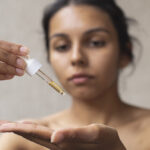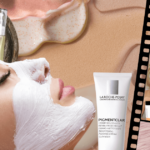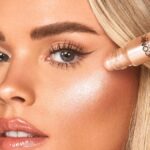In this article, we will address the concerns of a reader who is considering using beauty products containing estriol cream and MEP technology. The reader is perimenopausal and menopausal and is seeking products that have solid clinical research behind them.
Before we delve into the specific products mentioned, let’s discuss the use of hormone-containing creams in skincare. Estrogen-containing creams have been shown to improve skin thickness, hydration, and elasticity. However, it is important to be cautious when using these products, as topical estrogen can be absorbed into the bloodstream and may increase the risk of side effects such as blood clots, stroke, and certain types of cancer if too much is used for extended periods. An excess of absorption can cause the same symptoms as too much systemic estrogen: nausea, vomiting, breast tenderness, fatigue, and withdrawal bleeding.
When it comes to the specific products mentioned, Alloy’s estriol cream contains a weaker estrogen than estradiol, and we have fewer data on this ingredient’s safety parameters. Additionally, Alloy’s medical screening process has come under scrutiny. To test Alloy’s process, HNTFUYF’s treasured DermDiva, Heidi Waldorf, completed Alloy’s questionnaire in two ways. When answering the questions in a way that suggested her skin was perfect with no signs of aging, while disclosing her history of breast cancer, she was still recommended the estriol cream. However, when answering the full questionnaire, including her breast cancer history and medication use, Alloy’s recommendation included an SSRI, an antidepressant used to treat systemic menopausal symptoms, as well as vaginal and orgasm-stimulating products, all meant to treat symptoms that she did not have.
With Emepelle’s MEP technology, the product contains a non-hormone estrogen-receptor stimulator called methyl estradiolpropanoate. While MEP stimulates estrogen receptors in the skin, it is deactivated in the bloodstream. Whether users will see anything clinically different on their face depends on their skin condition.
At the end of the day, it is important to consult with a doctor before using any hormone-containing creams in skincare. While these products may work to reduce fine lines and wrinkles and improve skin texture, vitamin A–derivative retinoids have been proven to do the same. Sunscreen and retinoids continue to hold their place at the top of the pyramid for treating photoaging and aging skin. While Emepelle’s MEP technology may have a different effect than a simple moisturizer, whether the product is worth the $98 to $195 price tag depends on the user’s skin condition.
In conclusion, while the beauty industry offers many products promising to address the issues of menopause and aging skin, users must approach hormone-containing creams with caution. It is vital to consult with a doctor and be transparent about medical history and medication use. While vitamin A–derivative retinoids, sunscreen, and moisturizers continue to be the gold standard for treating photoaging and aging skin, consumers must make informed decisions when considering newer products.











